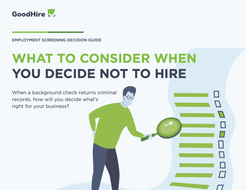How To Read A Background Check: A Guide For Employers
What terms appear on a criminal background check, and how should employers read them? Learn how to read and understand them in a few simple steps.
Resourcesarticles
Jim Akin
14 min read
When criminal background checks reveal infractions, misdemeanors or felonies, it’s important for employers and hiring managers to understand what each type of offense means.
Learn the differences between infractions, misdemeanors and felonies; their relevance to the job opening; and what laws, regulations, and company policies may say about them.
The importance of hiring qualified, reliable job candidates has a growing number of employers looking beyond resumés and interviews by conducting pre-employment screenings, often including criminal background checks.
These screenings can reveal information that job applicants may not disclose and that past employers may not be aware of, including arrests, convictions and pending criminal charges.
A range of offenses can turn up in national, federal, state, and county background checks, and it’s important for employers and hiring managers to understand the nature of each, its relevance to the job opening in question, and what laws, regulations and company policies may say about them.
An important first step in understanding how to read a background check is understanding how offenses are categorized. They are typically listed as felonies, misdemeanors and infractions, and may be further subcategorized by class. Understanding the significance of infraction vs. misdemeanor vs. felony can give employers’ perspective on the severity of various offenses, and their relevance (or irrelevance) to a particular job opening.

The definitions and classification of offenses as felonies and misdemeanors differ from state to state, but in general, felonies are more serious crimes than misdemeanors, and felonies carry more severe penalties and long-term consequences.
Felonies generally are:
Misdemeanors typically are:
A thorough understanding of felonies vs. misdemeanors on background checks requires recognizing the ways jurisdictions categorize offenses in terms of severity.
In many states, both felonies and misdemeanors are grouped by severity into subcategories known as classes or levels, each with corresponding penalty and sentencing guidelines. Felony classes are typically designated by letters A through E, with A being the most serious and E the least; felony levels are typically numbered 1 through 5, with 1 being the most severe. Misdemeanors typically follow a similar scheme, but may have fewer subcategories, such as classes A through C or levels 1 through 3.
Class A/Level 1 felonies are the most severe crimes, and their definitions are the most consistent from state to state. Examples include murder, kidnapping, and arson.
Category designations for other felonies vary to a greater extent from state to state, but typical examples include:
Definitions of misdemeanors vary significantly by state, but some typical examples by class include:
The class/level classification method is not used in every state; some states instead simply specify the penalties for each felony and misdemeanor in the laws that define them. Still other states take a hybrid approach; placing some felonies and misdemeanors into classes or levels, and specifying applicable penalties for other offenses that fall outside those categories.
It’s important to note that certain crimes are assigned lower classes or levels if they’re first offenses, but may be charged in a more serious category as repeat offenses. In some cases, such as DUI, repeat offenses can even result in a crime being treated as a felony rather than a misdemeanor, with penalties increasing accordingly.
Certain offenses can be charged as more severe crimes depending on their circumstances and consequences: For instance, striking another person without a weapon would typically be considered misdemeanor assault as long as no serious injury resulted from it, but if the victim were injured, the crime could be treated as a felony.
To help employers understand the nature of an offense, GoodHire annotates entries in criminal background checks using proprietary “offense class” and “offense subclass” labels that may not be available from other background check providers.
In addition to distinguishing felony vs. misdemeanor on background checks, employers running criminal background screens may also need to consider offenses known as infractions or violations. These are the least serious forms of lawbreaking, for which jail time is typically not an applicable punishment. Examples include many traffic and parking offenses, littering, and jaywalking.
Penalties for many infractions are fines that can be paid without making an appearance in court, but other infractions require appearing before a judge, and may require community service in addition to fines.
What does an infraction mean on a background check? While infractions are generally not cause for major concern, as with felonies and misdemeanors, they can escalate to more serious charges in the case of repeat offenses, or if an offender fails to pay fines or follow the court’s orders.
Because criminal background checks can reveal highly sensitive personal information, their use in the hiring process is strictly regulated. Like all pre-employment background screenings, criminal background checks must comply with the federal Fair Credit Reporting Act (FCRA), and fair hiring guidance issued by the Equal Employment Opportunity Commission (EEOC).
In addition to federal requirements, employers may have to adhere to additional state and local laws governing use of background checks in the hiring process.
States also differ in their policies on how long criminal records are eligible to be reported in background checks. Some states allow indefinite access to records, while others prohibit consumer reporting agencies from including records in background checks after a certain number of years:
Other details that may show up on criminal background checks include:
One category of offenses that typically does not appear on background checks is crimes committed by underage individuals and prosecuted in the juvenile justice system. These records typically are sealed or expunged—removed from the public record and treated legally as if the crime never happened.
If a criminal background check reveals criminal activity in a candidate’s past (or the disposition shows charges currently pending), it’s important for hiring managers to give that careful consideration in light of hiring priorities, company policies, and fair hiring laws and regulations.
Certain regulated industries forbid hiring individuals who’ve committed specific types of crimes. Convicted sex offenders cannot be placed in jobs involving care of children, seniors, or other vulnerable individuals, for instance, and individuals are barred from obtaining a license to sell stocks or other securities for seven years following a felony conviction.
What to do when a background check includes a misdemeanor? While less grave than felonies, certain misdemeanors may also preclude hiring for specific positions. Individuals with drunk-driving convictions, whether they are charged as felonies or misdemeanors, can’t be hired as commercial drivers, for instance.

In cases other than those where regulations outright prohibit hiring individuals who have been convicted of certain offenses, EEOC guidelines call for assessing each applicant individually, and considering criminal histories using a “nature-time-nature” approach:
In recent years, employers have been more open to hiring candidates with criminal histories, as long as they are otherwise qualified for the job. Laws and regulations have also been adopted to help prevent employers from excluding qualified individuals with conviction histories from hiring consideration:
As with any hiring decision, it’s critical to follow company hiring policies, EEOC guidelines and FCRA regulations to make non-discriminatory and consistent hiring decisions.
GoodHire pre-employment screenings include the industry’s most thorough criminal background checks, to provide hiring managers quick, accurate criminal history of every job candidate.
GoodHire’s screening protocols help you comply with federal, state and local hiring laws, including those governing disclosure and authorization requirements, adverse action, and fair hiring practices.
GoodHire’s digital screening platform also automates all steps required for federally compliant background checks, from notification of the intent to run a background check to securing written permission to do so, to disclosing all findings to the candidate and enabling them to comment on them. If background check findings lead to a decision against hiring the applicant, or to dismissal of a current employee, the GoodHire system helps employers follow federal adverse action requirements for notifying the individual, giving them the opportunity to respond, and then finalizing the decision following a final review.

The resources provided here are for educational purposes only and do not constitute legal advice. We advise you to consult your own counsel if you have legal questions related to your specific practices and compliance with applicable laws.
Follow Me
Jim Akin is a Connecticut-based freelance writer and editor with experience in employee relations, media relations, and social-media outreach. He has produced content and managed internal communications, business-to-business outreach, and consumer-focused campaigns for clients including Experian, VantageScore Solutions, Pitney Bowes, Medtronic, Microsoft, and Coca-Cola.
What terms appear on a criminal background check, and how should employers read them? Learn how to read and understand them in a few simple steps.
Using information to make hiring decisions based on information from sex offender registries can be complicated. Find out how to make informed, compliant decisions.